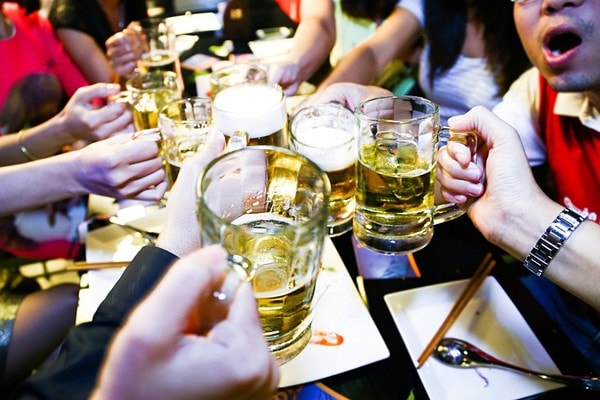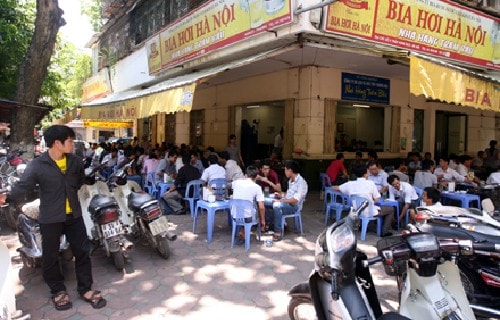"Fierce" debate about the ban on alcohol and beer sales
A synthesis of comments on the draft Law on Prevention and Control of Harmful Effects of Alcohol, Beer and Other Alcoholic Beverages sent to the Ministry of Justice for review shows that there has been a "fierce debate" between alcohol and beer businesses and associations with the Ministry of Health (the drafting agency) regarding the time limit for banning the sale of alcohol and beer.
According to the draft Law, wine, beer and other alcoholic beverages can only be sold between 6am and 10pm - except in the case of sales at international airports and in areas and streets that have been organized by competent state agencies as places specializing in food, entertainment and tourism businesses.
 |
| Regulations on the time of banning the sale of beer, wine and other alcoholic beverages are causing much controversy. |
Banning the sale of alcohol is a limitation of human rights?
Sending comments, Hanoi Alcohol Joint Stock Company said that there should not be a time limit for banning the sale of alcohol and beer because that would limit human rights.
The Association of Alcohol, Beer and Beverages reflects that limiting the time to sell alcohol and beer is not feasible because drinkers will have many ways to still be able to use alcohol and beer or lead to the situation of using alcohol and beer from uncontrolled sources.
The European Chamber of Commerce and Industry in Vietnam (EuroCham) expressed that the plan to only sell alcohol and beer during certain hours should be abolished because it affects tourism development and supporting industries (hotels, restaurants, bars, etc.) and is not consistent with some local regulations on tourism development (for example, Hanoi allows restaurants and bars to open until 24:00, except on weekends until 2:00 a.m.).
Consumers tend to consume more or less responsibly than before the ban. Furthermore, it will be difficult to demarcate areas and streets specializing in food, entertainment, and tourism because of the strong development of the market in recent years.
Meanwhile, Anheuser-Busch Inbev Vietnam Brewery Co., Ltd. is “concerned” that the time limit for sales could lead to consumers taking advantage of the time limit to drink more alcohol before or after the ban period, leading to higher health risks due to consuming alcoholic beverages that exceed the body's absorption in a short period of time.
Not accepting all four suggestions above, the Ministry of Health affirmed that the measure of regulating the time of banning the sale of alcohol and beer has been stipulated in 68/168 countries (including 9 ASEAN countries). Notably, in the context of Vietnam, there are no regulations to limit the time of selling alcohol and beer.
Human rights and civil rights as stated in the 2013 Constitution can only be restricted as prescribed by law in necessary cases for reasons of national defense, national security, social order and safety, social morality, and public health. Therefore, the provisions in this draft law are completely constitutional and legal.
“According to the experience of countries like Singapore or Thailand, when initially applying the regulation on limiting the time allowed to sell alcohol and beer, it is necessary to carry out communication, propaganda, explanation, dissemination, mobilization, and persuasion for people and business establishments to seriously comply with the law immediately after the promulgation of the law and have a roadmap of about 6 months so that people and establishments have time to prepare and comply,” the Ministry of Health explained.
The Ministry of Health also cited that 21 studies worldwide have all come to the same conclusion: limiting the time allowed to sell will reduce the harmful effects of using alcohol, beer and other alcoholic beverages, and increasing the time allowed to sell will increase the harmful effects of using alcohol, beer and other alcoholic beverages.
Experience in Thailand shows that, from a country with one of the highest traffic accident rates in the world, after having laws to control alcohol, beer and other alcoholic beverages, it has contributed to reducing the number of traffic accidents by 50% and saving more than 6 billion dollars in costs to overcome the consequences.
 |
| Locations for selling alcohol and beer must be within a radius of 200 meters from locations where alcohol and beer are not allowed to be sold. |
Regulations on distance between points of sale of alcohol and beer
Anheuser-Busch Inbev Vietnam Brewery Co., Ltd. supports the idea of banning the sale of alcoholic beverages in medical facilities, schools or children's play areas. However, the proposed restrictions on store density need to be carefully studied, especially the potential economic impacts on the tourism, hotel and entertainment industries, in which the growth of the alcoholic beverage industry is making a significant contribution.
“This restriction will cause difficulties for the operation of thousands of hotels, bars, restaurants, eateries and will impact the Government's tourism development strategy. On the other hand, such regulations will require huge resources to enforce and monitor, otherwise illegal business may arise, leading to tax losses,” the company commented.
However, the Ministry of Health did not accept this suggestion and said that currently there are 123 countries in the world that regulate the density of points of sale. For example, the US regulates that no more than one retail license for alcohol or beer is issued on a street.
“While the density of points of sale in urban areas in Vietnam is very high, there are 2-3 points of sale within a radius of 1,000 m (Research by the University of Public Health in 2016), increasing easy access to alcohol and beer” - the Ministry of Health affirmed.
Therefore, to ensure practicality, the drafting committee proposes to stipulate: From the effective date of this Law, the issuance, re-issuance of licenses, business registration certificates, and changes in business locations of wine, beer, and other alcoholic beverages must ensure a radius distance between locations.
Specifically, the distance between a business location for wine, beer, and other alcoholic beverages and a location where they are not allowed to sell them must not be less than 200m, except for areas and streets specializing in culinary and tourism businesses.

